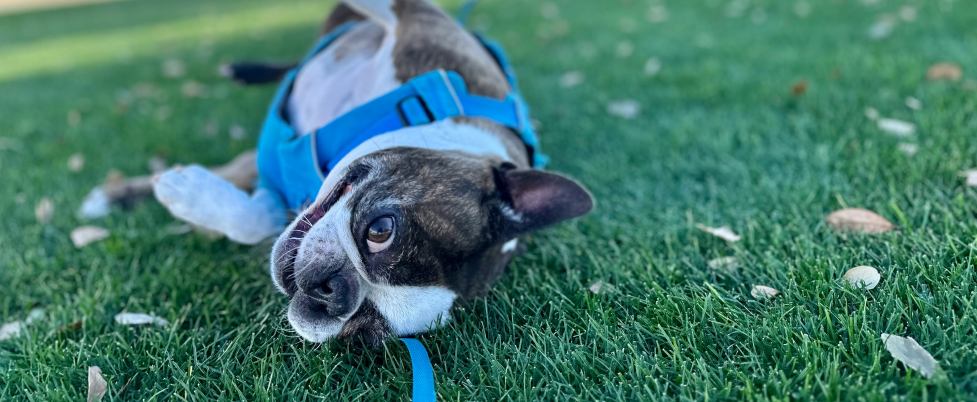TRAINING & BEHAVIOR / TRAINING BASICS

Disclaimer: I am not a vet. For any health-related concerns or medical advice regarding your Boston Terrier, please consult a veterinarian.
Introduction: Why Socialization is Crucial for Your Boston Terrier
Socializing your Boston Terrier early on is essential for raising a confident, well-behaved, and happy dog. Boston Terriers are friendly and affectionate by nature, but proper socialization helps them develop positive behaviors and prevents fear or aggression toward new people, animals, and environments. This guide will take you step-by-step through the process of socializing your Boston Terrier from a nervous pup to a confident social butterfly.
Step 1: Understanding Your Boston’s Temperament
Common Traits of Boston Terriers
- Friendly and Affectionate: Boston Terriers are typically people-oriented and love attention.
- Energetic: They’re playful and can be quite lively, making them great candidates for socialization.
- Sensitive: They may be shy or nervous in new situations, making early socialization essential to prevent behavioral issues.
Identifying Your Puppy’s Comfort Zone
- Some puppies are naturally outgoing, while others may be more reserved.
- Observe your Boston’s reactions to new environments and people to gauge how much exposure they need.
Step 2: When to Start Socializing Your Boston
Start Early
- Socialization can begin as early as 3 – 14 weeks of age. During this time, puppies are more receptive to new experiences and can develop strong, positive associations.
- However Veterinarians do recommend at least one round of vaccines 7 days before socialization and the first round of deworming. Puppies typically receive their first vaccinations at six to eight weeks of age.
- Socialization should continue through adolescence and adulthood to maintain your Boston’s confidence.
First Experiences Matter
- Introduce your puppy to new experiences gradually, ensuring each encounter is positive and rewarding.
- Never force a puppy into a situation that makes them uncomfortable. Gradually increase the difficulty of new experiences.
Step 3: Socializing with People
Introduce Your Boston to Different Types of People
- Family members: Begin socializing your Boston with everyone in your household.
- Strangers: Let your puppy meet people of different ages, sizes, and appearances.
- Children: Teach your puppy how to interact calmly with children by supervising playtime and ensuring gentle interactions.
How to Encourage Positive Interactions
- Reward your puppy with treats and praise after positive encounters with people.
- Keep initial introductions calm and slow, allowing your puppy to feel comfortable before getting too excited.
Step 4: Socializing with Other Dogs
Puppy Playdates and Dog Parks
- Arrange playdates with other vaccinated puppies to introduce your Boston to new dogs in a controlled setting.
- Dog parks are a great place for your Boston to meet new dogs, but keep a close eye on their behavior, especially with larger dogs.
Read Body Language
- Watch for signs of stress, fear, or aggression in both your puppy and other dogs. If the interaction becomes too intense, calmly remove your puppy and try again later.
- Encourage positive play behavior by rewarding your puppy for gentle and friendly interactions.
Step 5: Exposure to New Environments
Visit Different Places
- Take your Boston to various environments, such as parks, pet-friendly stores, and quiet neighborhood walks.
- Gradually expose them to different surfaces, sounds, and situations like car rides or busy streets.
Positive Reinforcement in New Environments
- Reward your Boston for remaining calm and confident when exposed to new experiences.
- Keep early outings short and increase their duration as your puppy becomes more comfortable.
Step 6: Managing Fear and Nervousness
Recognize Signs of Fear or Anxiety
- Avoidance, cowering, trembling, and barking can all indicate that your Boston is feeling stressed.
- If your puppy shows signs of fear, calmly remove them from the situation and provide comfort and reassurance.
Desensitization and Counterconditioning
- Gradually expose your Boston to the feared situation in a controlled manner, rewarding them with treats and praise for staying calm.
- This process helps your puppy develop positive associations with things that might otherwise cause fear or anxiety. on cue.
Step 7: Training for Socialization Success
Basic Commands for Better Control
- Teach your Boston basic commands like “sit,” “stay,” and “leave it.” These commands help keep your puppy under control in social settings and reinforce their sense of security.
- Use positive reinforcement consistently to encourage good behavior.
Leash Training
- Leash training is crucial for controlling your Boston during socialization outings.
- Ensure your puppy walks calmly on a leash to avoid pulling or darting toward new people or dogs.
Step 8: Socializing Your Boston for Long-Term Success
Consistency is Key
- Continue socialization throughout your Boston’s life. Even as adults, they benefit from exposure to new people, places, and situations.
- Keep introducing new experiences to your dog to maintain their comfort level in various environments.
Signs of Successful Socialization
- Your Boston is calm and confident around new people and animals.
- They are eager to explore new environments and enjoy meeting new friends.
- They respond well to basic commands in social settings.
Step 9: Dealing with Setbacks
Be Patient and Persistent
- Socialization is an ongoing process, and setbacks can happen. Stay patient, and don’t rush your Boston.
- If your puppy develops behavioral issues, consider working with a professional trainer or behaviorist who can help.
When to Seek Professional Help
- If your Boston shows consistent signs of aggression, fear, or anxiety that interfere with their ability to socialize, consider working with a certified dog trainer to address these issues.
Conclusion: Enjoying a Well-Socialized Boston Terrier
Socializing your Boston Terrier can be an enjoyable, rewarding process. By taking the time to introduce them to new people, animals, and environments, you’ll help your puppy grow into a confident, well-adjusted adult dog. Remember, socialization is an ongoing effort, and your Boston will continue to benefit from new experiences throughout their life.
By following this comprehensive guide to socializing your Boston Terrier, you will help your puppy develop into a friendly, confident, and well-behaved dog. Socialization is not just about exposing your pup to new situations, it’s about fostering positive experiences that will last a lifetime.

Additional Resources
American Kennel Club (AKC) Socialization Tips for Puppies
Other articles by this author

“Hi! I’m Weezie, a spirited Boston Terrier / French Bulldog mix and self-proclaimed expert on everything Boston.
- Article 1
- Article 2
- Article 3